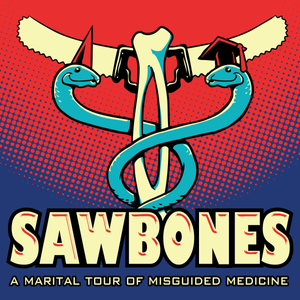
The Stanford Prison Experiment: A Story of Problematic Behavioral Health Research
02/29/24 • 58 min
Behavioral health is certainly within the bounds of medicine and, thereby, medical history. The Stanford Prison Experiment asked the question of whether the environment of prison compelled bad behavior from those within the system. In order to study this, this 1970's university psychology experiment went to extreme lengths to turn its research subjects (students) into faux prisoners and prison guards in the basement of the department's building.
It might not surprise you to find out that it did not go well.
Ethics in research are indeed important, as you'll appreciate after listening to this one.
References:
- Wikipedia Page on the Stanford Prison Experiment: https://en.wikipedia.org/wiki/Stanford_prison_experiment
- PDF of original publication of the Stanford Prison Experiment: http://pdf.prisonexp.org/ijcp1973.pdf
- Psychology Today interview with Philip Zimbardo: https://www.psychologytoday.com/intl/articles/200009/emperor-the-edge
- Wikipedia Page on Philip Zimbardo: https://en.wikipedia.org/wiki/Philip_Zimbardo
- Incarceration Rates Reference: https://www.prisonpolicy.org/global/2021.html?gad_source=1&gclid=CjwKCAiAiP2tBhBXEiwACslfnvW5miAa1VS0WqISsYuBYwIY52hMWPMlcVUG3Kbs_xNgzE4pG2DAuxoC6gMQAvD_BwE
- For further reading: The Milgram Experiment Wikipedia page: https://en.wikipedia.org/wiki/Milgram_experiment
- “The Stanford Prison Experiment” website: https://www.prisonexp.org/
- New Yorker Magazine Column, ‘The Real Lessons of The Stanford Prison Experiment’: https://www.newyorker.com/science/maria-konnikova/the-real-lesson-of-the-stanford-prison-experiment
- One of many bootlegs on YouTube of a BBC documentary on the experiment containing actual video footage: https://www.youtube.com/watch?v=F4txhN13y6A
- Hawthorne Effect, wikipedia: https://en.wikipedia.org/wiki/Hawthorne_effect
- PDF of October 1971 Congressional Testimony by Zimbardo: http://pdf.prisonexp.org/congress.pdf
- Preprint of Haslam’s Article, “Identity Leadership in the Stanford Prison Experiment”, in press in American Psychologist: https://osf.io/preprints/psyarxiv/b7crx to avoid paywall, noted on PubMed here: https://pubmed.ncbi.nlm.nih.gov/31380665/
#medicalhistory #medicine #history #podcast
-----
PHPod Merch Store (CLOSED)
-----
Podcast Linktree (social media links / reviews / ratings)
-----
#medicine #medicalhistory #history #historypodcast
Behavioral health is certainly within the bounds of medicine and, thereby, medical history. The Stanford Prison Experiment asked the question of whether the environment of prison compelled bad behavior from those within the system. In order to study this, this 1970's university psychology experiment went to extreme lengths to turn its research subjects (students) into faux prisoners and prison guards in the basement of the department's building.
It might not surprise you to find out that it did not go well.
Ethics in research are indeed important, as you'll appreciate after listening to this one.
References:
- Wikipedia Page on the Stanford Prison Experiment: https://en.wikipedia.org/wiki/Stanford_prison_experiment
- PDF of original publication of the Stanford Prison Experiment: http://pdf.prisonexp.org/ijcp1973.pdf
- Psychology Today interview with Philip Zimbardo: https://www.psychologytoday.com/intl/articles/200009/emperor-the-edge
- Wikipedia Page on Philip Zimbardo: https://en.wikipedia.org/wiki/Philip_Zimbardo
- Incarceration Rates Reference: https://www.prisonpolicy.org/global/2021.html?gad_source=1&gclid=CjwKCAiAiP2tBhBXEiwACslfnvW5miAa1VS0WqISsYuBYwIY52hMWPMlcVUG3Kbs_xNgzE4pG2DAuxoC6gMQAvD_BwE
- For further reading: The Milgram Experiment Wikipedia page: https://en.wikipedia.org/wiki/Milgram_experiment
- “The Stanford Prison Experiment” website: https://www.prisonexp.org/
- New Yorker Magazine Column, ‘The Real Lessons of The Stanford Prison Experiment’: https://www.newyorker.com/science/maria-konnikova/the-real-lesson-of-the-stanford-prison-experiment
- One of many bootlegs on YouTube of a BBC documentary on the experiment containing actual video footage: https://www.youtube.com/watch?v=F4txhN13y6A
- Hawthorne Effect, wikipedia: https://en.wikipedia.org/wiki/Hawthorne_effect
- PDF of October 1971 Congressional Testimony by Zimbardo: http://pdf.prisonexp.org/congress.pdf
- Preprint of Haslam’s Article, “Identity Leadership in the Stanford Prison Experiment”, in press in American Psychologist: https://osf.io/preprints/psyarxiv/b7crx to avoid paywall, noted on PubMed here: https://pubmed.ncbi.nlm.nih.gov/31380665/
#medicalhistory #medicine #history #podcast
-----
PHPod Merch Store (CLOSED)
-----
Podcast Linktree (social media links / reviews / ratings)
-----
#medicine #medicalhistory #history #historypodcast
Previous Episode

Dr. Dropkick Murphy: A Legendary Life (Book Biopsy with Author, Emily Sweeney)
If you're like me (Dr. Max) and the words "Dropkick Murphy" conjure images of the legendary Boston-based punk rock band, you might be surprised to know the history behind that name.
In this interview, Dr. Max sat down to interview Emily Sweeney, a staff reporter for the Boston Globe and author of a book on Dr. John "Dropkick" Murphy, who was not only a pioneering physician of earlier 20th century alcohol treatment, but was also a professional wrestler of his day.
This is an amazing book about a man who lived an amazing life. It's got medical history, professional wrestling and boxing history, punk rock, and many stops in between. We think you'll enjoy.
---------------------
**Do yourself a favor and use this link to get this excellent book: https://amzn.to/3T0Kgyp
Emily's newest project: The Cold Case Files (a regular series in the Boston Globe about unsolved murders).
Subscribe to her Cold Case Files Newsletter to stay up to date.
To follow and check out Emily Sweeney's other works:
Twitter/X: @emilysweeney
Instagram: @emilysweeney22
Threads: @emilysweeney22
Website and Other Books: https://linktr.ee/emilysweeney22
---------------------
#medicalhistory #punkrock #prowrestling #dropkickmurphys
-----
PHPod Merch Store (CLOSED)
-----
Podcast Linktree (social media links / reviews / ratings)
-----
#medicine #medicalhistory #history #historypodcast
Next Episode

Napoleon's Narcissism: Discussing a Conqueror's Personality Disorder
On this episode, Mike leads a discussion of the history of defining narcissistic personality disorder as a psychiatric diagnosis. Starting with Napoleon Bonaparte, and including other historical examples, we'll examine the diagnosis as defined through different perspectives in time.
Enjoy this unique approach to this historic giant.
Sources:
-https://www.history.com/news/napoleon-bonaparte-downfall-reasons-personality-traits
-https://www.grunge.com/208529/the-truth-about-napoleons-personality-disorder/
-https://sunlightrecovery.com/personality-disorder-napoleon/
-https://www.historicmysteries.com/history/napoleon-bonaparte/1404/
-https://en.wikipedia.org/wiki/Narcissistic_personality_disorder
#Napoleon #medicalhistory #medicine #history #psychiatry
-----
PHPod Merch Store (CLOSED)
-----
Podcast Linktree (social media links / reviews / ratings)
-----
#medicine #medicalhistory #history #historypodcast
If you like this episode you’ll love
Episode Comments
Generate a badge
Get a badge for your website that links back to this episode
<a href="https://goodpods.com/podcasts/the-poor-historians-medical-history-misadventures-332810/the-stanford-prison-experiment-a-story-of-problematic-behavioral-healt-48599163"> <img src="https://storage.googleapis.com/goodpods-images-bucket/badges/generic-badge-1.svg" alt="listen to the stanford prison experiment: a story of problematic behavioral health research on goodpods" style="width: 225px" /> </a>
Copy




